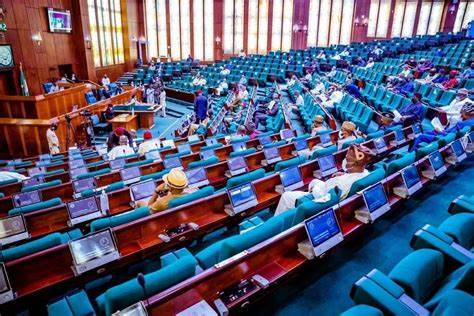POLITICS

HOUSE OF REPS SAYS "NO" TO BILL PROPOSING ROTATIONAL PRESIDENCY ACROSS SIX GEOPOLITICAL ZONES.
On Tuesday, the House of Representatives voted against a proposed constitutional amendment bill aimed at rotating the positions of president and vice president among Nigeria’s six geopolitical zones.
Alongside this, six other constitutional amendment bills listed on the House's order paper were also rejected.
However, the House agreed to revisit the bills individually on Wednesday for reconsideration based on their specific merits.
At the start of the debate, the House had suspended its rules to permit simultaneous discussion of all seven bills, giving members the option to contribute to any of them.
Meanwhile, the majority of lawmakers focused their attention on the bill proposing rotational presidency among the six geopolitical zones, with many voicing strong opposition and cautioning that such a move could establish a troubling precedent.
Leading the opposition was Deputy Minority Leader Aliyu Madaki, who argued that the concerns the bill aimed to address were already being handled by the Federal Character Commission. He stressed that the issue of rotation should not be enshrined in the constitution but should continue to operate as it currently does.
Madaki further noted that political parties already have internal structures in place to promote equitable distribution of key positions during each election cycle.
Sada Soli (APC, Katsina) acknowledged the proposed amendment as well-intentioned but questioned whether it might compromise the quality of leadership. He argued that implementing a rotational system could harm national unity by fueling regional and ethnic competition among the geopolitical zones.
Similarly, Shina Oyedeji (PDP, Oyo) cautioned that enshrining the rotation principle in the constitution could spark fresh waves of agitation, as states and ethnic groups within each zone might begin demanding their turn in the name of fairness and justice.
He believes that everybody in the country should be given equal opportunity to aspire to the office of the President and Vice President, saying “if you adopt zoning and it’s coming to the Southwest for example, which state will take the position? Is it Ogun or Oyo.
He said, “Whatever you do in Nigeria, there will always be a cry of marginalisation. We should not engage in a dangerous precedent by putting it in the Constitution”.
Olumide Osoba (APC, Ogun) acknowledged the amendment as somewhat innovative but maintained that it would be inappropriate to dictate to political parties where to select their candidates from during elections.
On the other hand, Minority Whip Ali Isa supported the proposal, arguing that all six geopolitical zones deserve a fair chance at producing the president. He also advocated for extending the rotation principle to the state level, suggesting that governorship positions be rotated among the three senatorial districts within each state.
Isa emphasized that every geopolitical zone has capable individuals qualified to lead both Nigeria and even the West African subregion. He added that the Federal Character principle already promotes fairness and balanced representation among all states.
He commended the Deputy Speaker for acknowledging the fact that there is the need to allow fairness, saying “in 2027, we should allow the Presidency go to the North East for the sake of fairness and allow all zones to produce the President”.
During the debate, Clement Jimbo (APC, Akwa Ibom) supported the bill, stating it was aimed at addressing the longstanding marginalization of minority groups in Nigeria. He proposed that a constitutional provision be introduced to ensure the rotation of the presidency among all six geopolitical zones. Once each zone has had its turn, he suggested the principle could then be discontinued.
Despite the debates and various perspectives shared, the bill advocating for a rotational presidency, along with other proposed constitutional amendments, failed to pass the second reading following a voice vote in the House.
Among the other rejected bills were:
A bill seeking to amend the 1999 Constitution to strip the Independent National Electoral Commission (INEC) of the powers to register and regulate political parties, transferring those powers to a proposed Office of the Registrar General of Political Parties.
Another bill aimed at formally enshrining the principle of rotating the offices of the President and Vice President among Nigeria’s six geopolitical zones: North Central, North East, North West, South East, South South, and South West.
Additional bills that were rejected by the House of Representatives include:
A bill to amend the Constitution of the Federal Republic of Nigeria (Cap. C23, Laws of the Federation, 2004) to establish the Office of the State Auditors-General for Local Governments and the Federal Capital Territory Area Councils. The proposal aimed to strengthen fiscal oversight, promote accountability, and enhance good governance at the grassroots level by ensuring the independence and defined functions of these offices.
A bill seeking to amend the 1999 Constitution to create Ughelli East Local Government Area in Delta State, thereby adjusting the administrative and political structure of the state.
All these bills, including the rotational presidency proposal, failed to advance past the second reading during the plenary session.
"This represents a significant development in our ongoing coverage of current events."— Editorial Board









